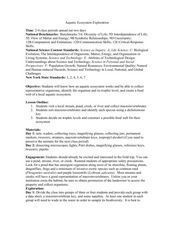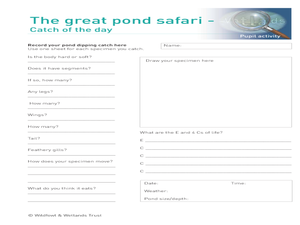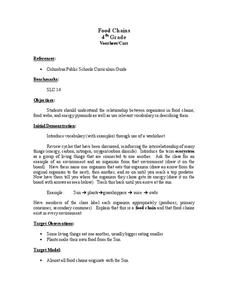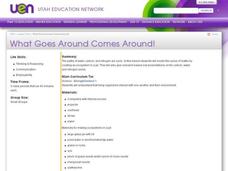Curated OER
Pond Ecology
A lab activity is a great way to incite thoughtful questioning and scientific processes. Pupils will collect organisms with a Petri dish, make observations, sketch the organism, ask questions, then attempt to identify the specimen...
Curated OER
Using Environmental Models to Determine the Effect of Acid Rain on an Ecosystem
Demonstrate to your middle school science learners how chalk breaks down in a weak acid. Discuss what affects acidic rain might have on ecosystems. Lab groups then choose one of two questions: "How does acid precipitation affect an...
It's About Time
The Nitrogen and Phosphorous Cycles
How do we affect the ecosystem, and what can we do to preserve it? Pupils explore chemicals that promote and inhibit plant growth, then discuss the importance of nitrogen and phosphorus to the survival of organisms and describe how...
Curated OER
Aquatic Ecosystem Exploration
Students visit a local stream, pond, creek, or river and collect macroinvertebrates. They sort macroinvertebrates and identify each species using a dichotomous key. Students decide on trophic levels and construct a possible food web for...
Curated OER
Ecosystem In A Bottle
Ecosystem activities show how everyone and everything is interconnected. The smallest change can make a big impact.
Curated OER
The Marvels of Mud
Young scientists roll up their sleeves and get a little dirty in this three-day earth science investigation. Following the scientific method, children monitor the growth of algae in pond water samples in order to determine the role that...
Pennsylvania Department of Education
Animal Classes and Their Ecosystems
Students explore animal characteristics by participating in an environment identification activity. In this animal habitat lesson, students discuss a range of different wild life and the ecosystems that they are a part of. Students view...
Curated OER
Food Chains
Learners take a look at the relationship between organisms in food chains, food webs, and energy pyramids. After an opening demonstration by the teacher, pupils are split up into groups. Each one is assigned an environment such as:...
Curated OER
Surface Water/Groundwater
Water wizards write short answers and fill in the blanks about Earth's surface water and groundwater. They also identify the condition of the soil in a diagram. Use these two worksheets as a reading comprehension assignment if your...
Curated OER
The Water Cycle
Students develop a better understanding of the need to conserve our renewable resources. In this water cycle lesson students take notes, complete a guide sheet and illustrate the water cycle.
Curated OER
Dibble Pond Ecosystem
Students collect specimen and analyze it. In this biology activity, students analyze and evaluate the diversity found in specific environment. They use the correct terminology as they do their write up for the experiment.
Curated OER
Water Cycle (Role of Water)
Second graders explore the role of water as a natural resource in order to conserve and protect its use for future generations.
Curated OER
Pond Safari
Students investigate organisms and animals by examining a nearby pond. In this ecosystem lesson, students participate in a field trip to a local pond where they utilize a net to gather animals, plants and pollution items, Students...
Curated OER
A Frog's Life Story
Students investigate the lives of frogs by completing several worksheets. In this biology lesson, students discover the life cycle of a frog from tadpole to death. Students complete frog life cycle puzzle as well as create a life cycle...
Curated OER
Ecology - Ecosystem
Third graders research ecosystems, the work of ecologists, John Muir's contribution to the environment and an endangered species of their choice. They read books, participate in discussions, and write reports.
Curated OER
The Living Environment
Students explore the cycles of an ecosystem. In this environmental science lesson, students work in groups to research the nitrogen cycle, the water cycle, or the oxygen-carbon dioxide cycle. Students prepare a PowerPoint or other...
Curated OER
Food Chains
Fourth graders investigate food chains. They review cycles and discuss ecosystems. They select an environment and create a food chain in small groups. They write their food chain and label it for the class to evaluate. They create...
Curated OER
What Goes Around Comes Around!
Students create an ecosystem in a jar to show a model of the water, carbon, and nitrogen cycle. Working in small groups, they research and present orally the information they find on this cycle.
Curated OER
Water Wonders
Students explore hydrology concepts. In this environment and biology instructional activity, students identify and describe macroinvertebrates using a variety of pictures and resources. Students observe and write about a classroom...
Curated OER
Mini-Ecosystems
Pupils use plastic bottles to create terrariums and plant Venus Flytraps. They observe the plants and the terrariums for illustrations of the water cycle and species' adaptations to a specific environment.
Curated OER
Animals Finding Rice Paddies
Fourth graders examine the animals who live in rice paddies and create a chart. For this rice lesson, 4th graders link the types of animals living in each ecosystem with a bar graph. Students use colored bars to show animals that live...
Curated OER
Beaver Ecology
Learners explore the lives of bgeahvers. They identify the physical and behavioral adaptations that help beavers survive in their environment. Students compare and contrast how beavers influence the ecology of both forest and aquatic...
Curated OER
Migration Isn't Just For The Birds
Fourth graders explore the concepts of conservation using a reading story that describes a flock of geese. The ecosystems are also described in the lesson and the effects of pollution.
Curated OER
Fresh Water Facts
In this fresh water worksheet, students click on the links in the questions about fresh water to find the answers and then come back and answer the questions. Students answer 9 questions total.

























